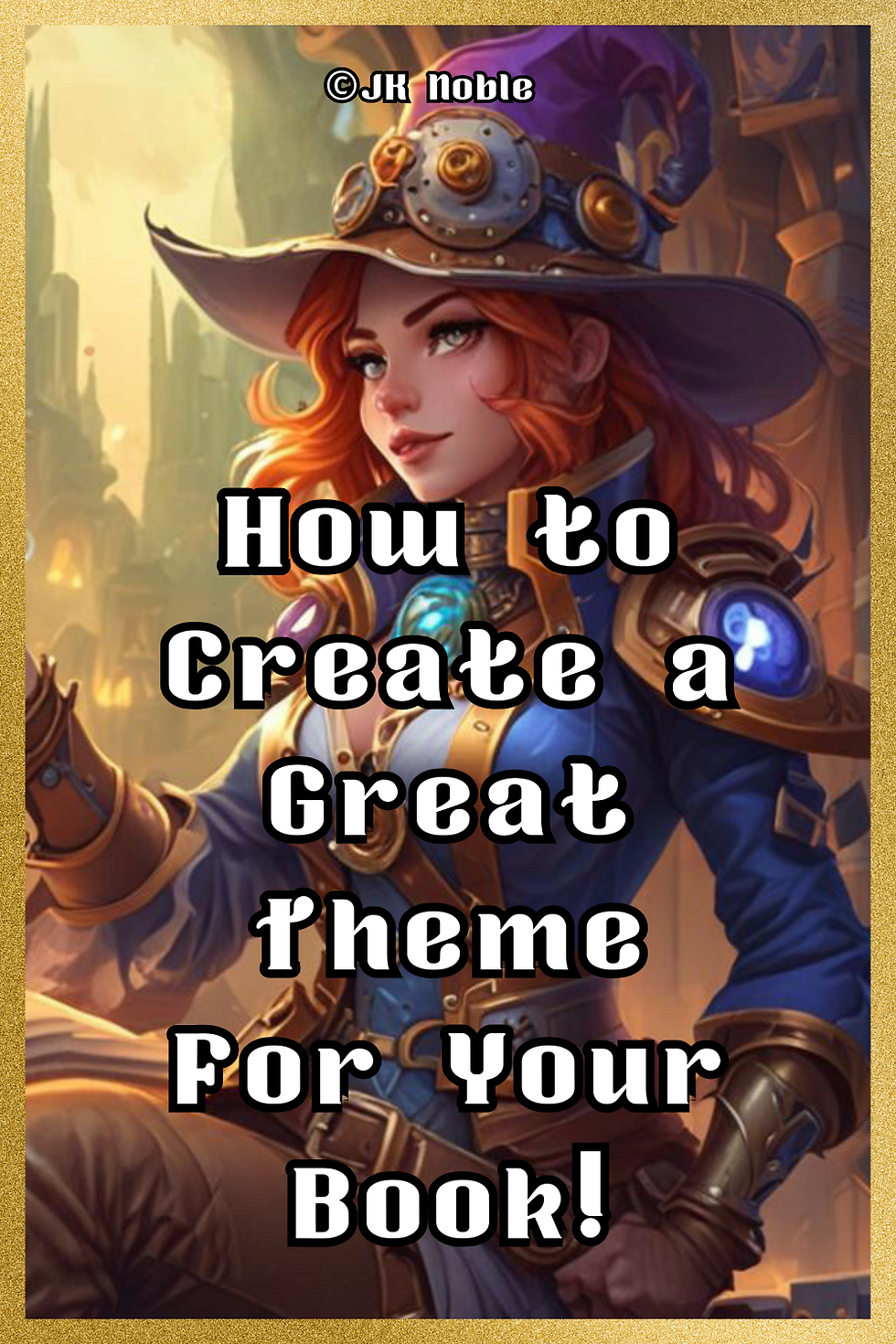What Kind of Fantasy Should You Write?
- J.K. Noble

- Aug 5, 2021
- 7 min read
Updated: Aug 30, 2022
Welcome Fantasy Writers and Enthusiasts!

Are you looking for some assistance with your fantasy project? Do you want to create something unique, apart from the basic magic wielders like witches, wizards, warlocks, and mages? Or the ordinary fantasy creatures like ogres, trolls, elves, fairies, and dragons? Want a fantasy that's out of the box and has nothing to do with medieval times? As a Young Adult Fantasy Author that created magic systems, unique governments, fantasy creatures, and nations, I can help you there!
I must first point out that most mainstream fantasies became very successful because they were cliche and continuously used the same magic systems, magic wielders, and magic creatures. For example, how many renditions of Cinderella have you seen? I'm sure it's impossible to count the amount of Cinderella stories there are.
With that said, there is more than one approach you can take when writing a unique fantasy:
1. Use the mainstream creators and magic wielders, with a strong and unique story to make it memorable.
There are so many similar fantasies out there, however, their key differences are character development and plot. This goes to show how important exceptional writing skills and a strong plot are. Even if you lack unique world-building, you can still touch the lives of many and gain major popularity for your work.
2. Tweak the mainstream magic wielders and fantasy creatures to your preferences.
a. How many types of werewolves and vampires have you read about? Here's a brief list of differences of famous vampires from books and shows/films:
1. Dracula by Bram Stoker. Many of the rules applying to the original literary vampires traveled to modern vampires today. Like sleeping during the day in dirt, or the inability to enter a home uninvited, vampires fear garlic, and they will die with a stake to the heart. Yet, there are many details from Dracula that were changed by modern day media vampires. Like the ability to climb walls, or shape-shift into a bat, wolf, large dog, fog, mist, or dust in moonlight.
2. Dark Shadows (1966-1971) Blood thirsty vampire that can live off human and animal blood. This was a splendid example of humanizing the villain since Barnabas Collins was forced into becoming a murderer when he turned into a vampire. This is where media really took a turn and began showing monsters with heart and morality.
3. Interview with the Vampire (1994 movie, book by Anne Rice written in 1968) Rice used vampirism as a metaphor for “lost souls”, which is very poetic. Her vampires cried tears of blood, they could read minds, and fire/sunlight destroyed them.
4. Buffy the Vampire Slayer (1997-2003) In this TV show, Vampires are hybrids, demons inside of human bodies. The demons leave their dimension and possess a corpse. The human soul departs from the body. They thrive on mammalian blood. Becoming a vampire includes drinking a sire’s blood near death (has nothing to do with getting bitten). Some vampires have a psychic connection with their sire. They do not need to breathe. They have superhuman strength and can move and heal faster than humans. If pierced in the heart by wood, they will die.
5. Angel (1999-2004) Same rules as Buffy the Vampire Slayer, as it is a spinoff.
6. Underworld (2003-2016) Rules include: Vampires must hide from humans unless they with to turn them into vampires. Vampires are not allowed to drink human blood directly. Vampires are not allowed to intermingle with Lycans (werewolves).
7. True Blood (2008-2014, books by Charlaine Harris 2001)
8. Vampire Diaries (2009-2017, the books by L. J. Smith released in 1991) In this universe, vampires still have their human souls after death. They can live off any blood, however human is most delicious. Sharing their own blood with a human transforms the human into a vampire. Witches created the original vampires. An herb called vervain weakens and burns vampires. Vampires can turn their morality on and off like a switch, usually happens after traumatic events, and it is very hard to flip their empathy back on. Vampires can eat human food, their bodies function like a human body. They can get drunk or high but have a higher tolerance. And so on!
9. Stephenie Meyer's Vampires of The Twilight Saga (books released in 2005-2020, movies form 2008-2012) had their own set of rules like having sparkly skin in the sunlight and individual superpowers. All vampires can move at lightning speed. They resemble perfected versions of themselves during their mortal lives. They neither sleep, breathe, or consume regular food. Werewolves and vampires here smell gross to one another.
b. What about Witches?
I love the idea of witches in any fantasy. Witches have become so mainstream because they are so cool and fun to incorporate into fantasy projects. Their powers scale from little significance to catastrophic. As we know there can be good and evil using this power. In Christian entertainment, witches are represented as evil, demonic, and devil worshipers. Whereas in other media, like Charmed, you are born with the mystical power of being a witch and are meant to use them for the good of the world. Usually. In real life, however, witches use their powers for various reasons, such as healing, and there are many types of witches: shamans, kitchen witches, crystal witches, astrology witches, fairy witches, dragon witches, and so forth! Some witches take inspiration from pop culture media witches like Sabrina and Charmed for their personal practices.
Based on the popular supernatural/ fantasy monsters we read about and watch on the big screen, we can see that a creator can use the same terminology, but put their own spin on things, adding tons of unique rules to make their fantasy world as realistic as possible.
3. Use magic creatures and magic according to the mythology of a specific country.
a. Greek Mythology is the broadest and might be the most fun. There are an infinite amount of hybrids, monsters, and deities. Almost anyone can be the son or daughter of a god because the gods in Greek mythology were known for being loose. Make your fantasy wielders, magic system, government, and creatures! So many books and media have used Greek mythology. (Hercules, Blood of Zeus, Percy Jackson, Clash of the Titans, etc.)
b. Egyptian mythology isn't as broad but might be fun to dive in and create something like the Gods of Egypt or The Mummy!
c. European mythology is where you will find fairies, elves, trolls, etc. Renditions of this type of fantasy often include medieval settings and a monarchy government.
d. Viking mythology. Like the Greeks, Viking mythology is very broad. There's a bunch of witches, wizards, ghosts, trolls, and of course the Viking gods.
e. In any country, at any ancient time period, you will find mermaids. That's mysterious in and of itself, perhaps worth writing about, in a way that is unlike the popular Little Mermaid.
f. Indian and Asian mythology have their fair share of deities several of which were worshiped with idols and shrines. Asian cultures and media showcase a lot of demons witch can shape-shift, or look like humanoids, snakes, or dragons.
g. Nowadays, aliens are a popular topic. But unfortunately, aliens somehow fall into the sci-fi genre, not fantasy.
h. In Biblical mythology you will find God, angels, demons, spirits, golems, giants, and sea monsters.
4. Create your own fantasy wielders, magic system, government, and creatures!
Not everybody wants to do this. For one thing, it's easier to do what's been done before, because it is familiar to your readers, familiar to you, and it is safe. A lot of effort and time goes into creating your own rules and magic for a fantasy world, and you might rather use that time developing your characters and plot. Also, creativity does not come easily to some, and there is no shame in that! This will not hinder the impact your story has on its readers.
But if you want to go this route, it is possible! Don't discourage yourself.
Here is a list of things you should consider if you want to create your own fantasy world:
1. How does the magic in your world work?
2. Do you magic wielders all have the same powers (Harry Potter) or are they unique depending on the individual (X-Men)?
3. What is the government like?
4. What is it like where they live?
5. What types of creatures/ fauna/ weather conditions are there?
6. How old is your world? Consider writing a brief history of your setting to make the place seem more real in your mind and possibly offer some answers to why it is the way it is presently.
7. Are their different nations/ intelligent species? How do they dress? Religion? Culture?
For more help with this topic, check out these blog posts:
5. Finally, why is fantasy so important?
As we know, superheroes do not need to have powers. But isn't it interesting how relatable fictional characters with magical powers are? In every fantasy, we watch the main character find that they have the potential to be great. They might enter a world of problems with the special ability to fix them. After processing their situation, the main character might put up a fight or selflessly put themselves in jeopardy. They will go through some trial, error experiences to harness their powers and gain more control over them. More often than not, their powers are linked to their feeling, so essentially, they are maturing and gaining control over their emotions, learning what battles they need to fight for. Afterward, a series of problems arise, in the form of chaos or a person standing in the way of morality. The main character might feel swayed by evil, or not, depending on their personality and the weight of their circumstances. But in the end, they will remember that whether or not they will be rewarded, good must prevail.
Not everybody has this amount of strength, but to witness the developing strength of a character and go through their struggles with them gives one a sense of not being alone in the world. An inspiring display which everyone, anywhere, can relate to and benefit from. By using these fantasy tropes, we showcase the inner power we all have, and the responsibility to make a difference in the world.
That is why fantasy is important.



.png)





Comments